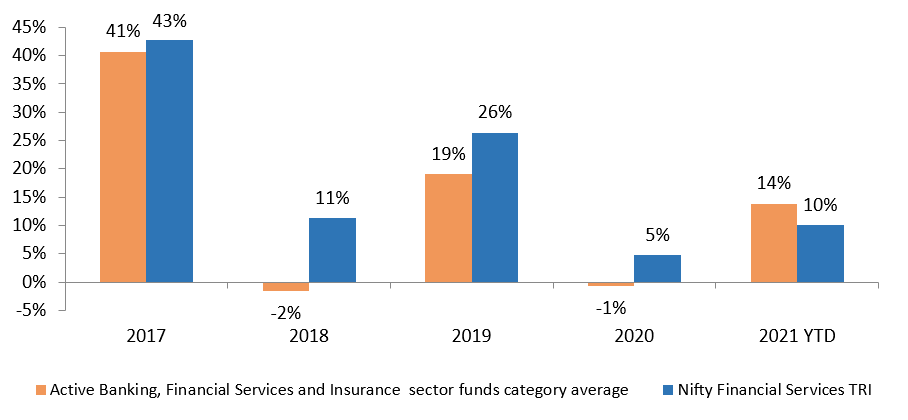Financial Services Financial Services is one of the most important sectors of an economy. Financial Services sector comprises of both Banks and Non-Banking Lending Institutions; Insurance and Asset Management Companies are also part of Financial
Services Sector. A strong and well regulated Financial Services Sector can be critical for the growth of an economy.
Financial Services in India
The Indian banking system consists of 12 Public Sector Banks, 22 Private Sector Banks, 46 Foreign Banks, 56 Regional Rural Banks, 1485 Urban Cooperative Banks and 96,000 Rural Cooperative Banks in addition to co-operative credit institutions (source:
RBI, data as on: 31st March 2021). Most Investors associate Financial Services Sector with Banks. However, the ambit of Financial Services Sector is broader. Apart from Banks, we have Non-Banking Lending Institutions like Term Lending, Housing
Finance, Commercial Vehicle Finance, Leasing and Hire Purchase Companies, etc.
Passive investing in financial services
Apart from diversified equity funds, which have financial services in their portfolios, there are sectoral funds which invest only in financial services. However, most of these funds have failed to beat Nifty Financial Services TRI (see the chart
below). In 3 out of the last
5 years, even most of the top quartile funds in the category were unable to beat the Nifty Financial Services TRI. Therefore, a passive exposure to this sector through ETFs or Index Funds may make sense.
Benefits of passive investing
- No unsystematic risks: Fund managers of active funds are overweight/underweight on some stocks relative to the index with the aim of creating alphas. This gives rise to unsystematic risks. ETFs and index funds aim to replicate the performance
of the index. There is no unsystematic risk.
- Rule based Portfolio construction: Rule based selection and weighing ensures that indices are faithful representative of the intended objective with scheduled rebalancing of stocks ensuring inclusion of more relevant stock and exclusion
of stock which doesn’t satisfy or capture the objective anymore
- Lower costs: Total Expense Ratios (TERs) of passive funds are much less than active funds. Costs are deducted in the NAVs of Mutual Fund Schemes. Therefore, a scheme with the lower costs will have higher returns for the same performance
of under lying portfolio.
An Investor Education and Awareness Initiative by Mirae Asset Mutual Fund. All Mutual Fund investors have to go through a one-time KYC (Know Your Customer) including the process for change in address, Phone number, bank details, etc. Investors should deal only with registered Mutual Funds details of which can be verified on SEBI website (https://www.sebi.gov.in) under ‘Intermediaries /Market Infrastructure Institutions’. For further information on KYC, RMFs and procedure to lodge a complaint in case of any grievance, you may refer the Knowledge Centre section available on the website of Mirae Asset Mutual Fund. Investors may lodge complaints on https://www.scores.gov.in against registered intermediaries if they are unsatisfied with the responses. SCORES facilitate you to lodge your complaint online with SEBI and subsequently view its status.
Mutual Fund investments are subject to market risks, read all scheme related documents carefully.
 ETF Website
ETF Website
 Invest Now
Invest Now
 Online e-KYC
Online e-KYC

![mirae asset usa]() Australia
Australia
![mirae asset brazil]() Brazil
Brazil
![mirae asset colombia]() Colombia
Colombia
![mirae asset hong kong]() Hong Kong SAR
Hong Kong SAR
![mirae asset Japan]() Japan
Japan
![mirae asset uk]() United Kingdom
United Kingdom
![mirae asset usa]() United States
United States
![mirae asset singapore]() Singapore
Singapore
![mirae asset uk]() Ireland
Ireland
![mirae asset canada]() Canada
Canada
![mirae asset india]() Global
Global
![mirae asset australia]() Australia
Australia
![mirae asset hong kong]() Hong Kong SAR
Hong Kong SAR
![mirae asset india]() India
India
![mirae asset korea]() Korea
Korea
![mirae asset korea]() UAE
UAE
![mirae asset uk]() United Kingdom
United Kingdom
![mirae asset usa]() United States
United States
![mirae asset vietnam]() Vietnam
Vietnam
![mirae asset korea]() Korea
Korea
 Global
Global
 Australia
Australia
 Hong Kong SAR
Hong Kong SAR
 India
India
 Korea
Korea
 UAE
UAE
 United Kingdom
United Kingdom
 United States
United States
 Vietnam
Vietnam
 Korea
Korea
 Australia
Australia
 Brazil
Brazil
 Colombia
Colombia
 Hong Kong SAR
Hong Kong SAR
 Japan
Japan
 United Kingdom
United Kingdom
 United States
United States
 Singapore
Singapore
 Ireland
Ireland
 Canada
Canada





